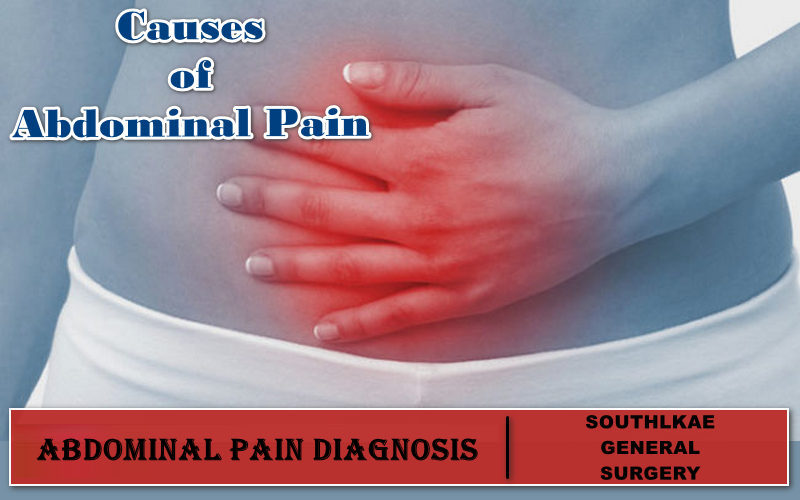Abdominal pain can happen between the chest and pelvic area. Pain in the abdomen could be crampy, throbbing, dull, intermittent, or sharp shooting which is also known as a stomachache. Inflammation or illnesses that influence the organs in the abdomen could cause stomach pain.
Significant organs situated in the abdomen include:
- kidneys
- intestines (large and small)
- appendix (a part of the large intestine)
- spleen
- stomach
- liver
- gallbladder
- pancreas
Viral, bacterial, or parasitic contamination that influences the abdomen and digestive organs may likewise cause noteworthy abdominal pain.
What causes Abdominal Pain?
Many factors can cause abdominal pain. Although the main reasons are infection, inflammation, impediment (blockage), unusual growth, and intestinal issues.
Throat infection, intestines infection, and blood infection can make bacteria enter your digestive tract that may cause pain in the abdomen. These infections may likewise cause changes in digestion for example diarrhea or constipation.
Issues related to menstruation are additionally a potential source of lower stomach pain, yet more usually these are known to cause pelvic pain.
Some other factors related to abdominal pain include:
- diarrhea
- gastroenteritis (stomach flu)
- constipation
- acid reflux (when stomach substance is released in reverse into the esophagus, causing heartburn and other side effects)
- stress
- vomiting
Diseases that influence the digestive system can likewise cause chronic abdominal pain. The most widely recognized are:
- gastroesophageal reflux disease (GERD)
- irritable bowel syndrome or spastic colon (a disorder that leads to abdominal pain, changes in bowel movements, and cramping)
- Crohn’s disease (an inflammatory bowel disease)
- lactose intolerance (failure to process lactose, the sugar found in milk and milk products)
Reasons for serious abdominal pain include:
- damage to organs or near to damage (such as a burst appendix, or appendicitis)
- gallbladder stones (known as gallstones)
- kidney stones and infection
Various kinds of abdominal pain
Abdominal pain can be explained as localized, cramp-like, or colicky.
Pain limited to one area of the abdomen known as localized pain. This sort of pain often happens due to a specific organ. The most widely recognized reason for localized pain is stomach ulcers (open bruises on the inward lining of the stomach).
Pain in the abdomen more or less like a cramp is an indication of diarrhea, constipation, bloating, or flatulence. In females, it can be related to menstruation, miscarriage, or complexities in the female conceptive organs. This pain generally comes and goes and may subside all alone without any treatment.
Colicky pain is an indication of serious conditions, for example, gallstones or kidney stones. This pain occurs all of a sudden and may feel like an extreme muscle spasm.
Area of pain inside the abdomen
The area of the pain inside the abdomen might be a sign of its reason. Abdominal pain generalized throughout the abdomen (not in designated location) may indicate:
- Crohn’s disease
- Appendicitis (irritation of the appendix)
- traumatic injury
- irritable bowel syndrome
- urinary tract infection
- the influenza
Abdominal Pain in the lower section may indicate:
- intestinal obstruction (blockage)
- appendicitis
- ectopic pregnancy (a pregnancy that happens outside the womb)
In females, pain occurs in the reproductive organs of the lower section of the abdomen can happen due to:
- severe menstrual pain (known as dysmenorrhea)
- ovarian cysts
- pelvic inflammatory disease
- fibroids
- endometriosis
- miscarriage
- ectopic pregnancy
Upper abdomen pain can be caused by the following:
- gallstones (gallbladder stones)
- pneumonia
- heart attack
- hepatitis (inflammation of the liver)
Center abdomen pain can be caused by:
- gastroenteritis
- appendicitis
- uremia (buildup of waste items in the blood)
- injury
Left abdomen pain can be caused by the following:
- Crohn’s disease
- kidney infection
- ovarian cysts
- cancer
- appendicitis
Pain in the upper left of the abdominal is mainly caused by:
- enlarged spleen
- fecal impaction (stool that can’t be eliminated due to solidification)
- kidney infection
- heart attack
- injury
- cancer
The reason for lower right abdominal pain may include:
- appendicitis
- hernia (when an organ bulges through a weak area in the abdominal muscles)
- kidney infection
- flu
- cancer
Pain in the upper right abdominal pain can be caused by:
- hepatitis
- pneumonia
- injury
- appendicitis
When to consult the doctor
Mild pain in the abdomen may disappear without any treatment. But, in a few cases, pain in the abdomen may compel you to visit the doctor.
If it is severe abdominal pain related to trauma (from an accident or any unfavorable incident) or you feel pressure or pain in your chest, call 911 immediately,
You should look for immediate medical care if the pain is extremely worse that you can’t rest, sit or have to curl into a ball to get settled or if you have any of the accompanying:
- bleeding in stools
- high fever (higher than 101°F)
- blood in vomiting (known as hematemesis)
- persistent nausea or vomiting
- change in skin and color to yellowish
- swelling or serious tenderness of the stomach
- breathing issue
Book an appointment with a doctor if there are any visible signs of the following symptoms:
- pain in the abdomen for more than 24 hours
- prolonged constipation
- vomiting
- a burning sensation during the passing of urine
- fever
- appetite loss
- unexplained loss of weight
Consult with your doctor in case you’re pregnant or breastfeeding and you feel abdominal pain.

